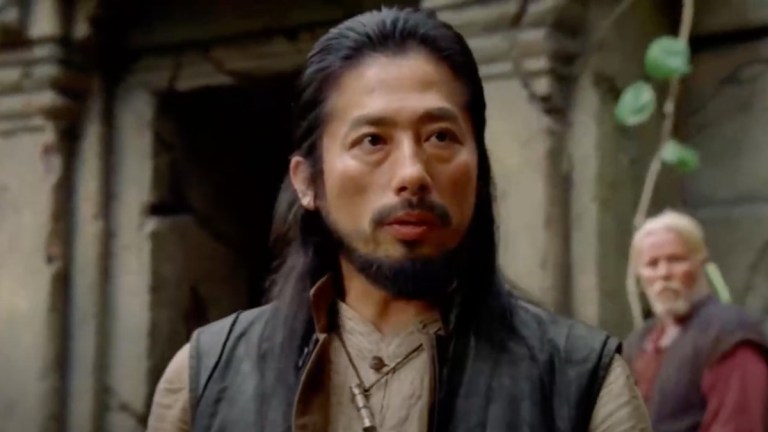Prolific Japanese actor Hiroyuki Sanada brought real gravitas to the final season of Lost when it needed it the most.

Hiroyuki Sanada, star and producer of FX’s excellent miniseries Shōgun, is one of the most successful Japanese actors working in Hollywood today. English-speaking audiences have to come to know and appreciate the Tokyo-born performer through his roles in films such as The Last Samurai, Speed Racer, The Wolverine, Army of the Dead, and John Wick: Chapter 4.
TV nerds (including yours truly) had an entirely different introduction to Hiroyuki Sanada, however. For us, Sanada’s Western pop culture career begins with the final season of classic ABC drama Lost.
Despite what you may have heard about its ending (if I ever have to explain that they weren’t “dead the whole time” again, I swear to God…) Lost is one of the best genre series to ever grace network television. It also, admittedly, wasn’t perfect. And its simultaneously ingenious and infuriating use of Sanada in its sixth and final season is a perfect microcosm of the show overall.
Sanada appears in the first six episodes of Lost season 6 as the enigmatic Dogen. In keeping with Lost tradition, Sanada’s character’s name is associated with the name of a famous philosopher (Locke, Bentham, Rousseau, Hume, et. al.), in this case 13th century Buddhist thinker Dōgen Zenji. Lost‘s Dogen, however, is a bit more physical than this historical counterpart.
A part of the Island contingent known as The Others, Dogen lives in a mysterious sanctuary known as “The Temple” that, due to his presence, the dreaded Man in Black a.k.a. Smoke Monster (Titus Welliver) wouldn’t dare enter. At the beginning of season 6, Dogen allows our lead characters to find refuge in the Temple when survivor Hurley (Jorge Garcia) presents him with a note from Island deity Jacob (Mark Pellegrino). He also allows for the severely injured Sayid (Naveen Andrews) to convalesce in the Temple’s healing pool, which unfortunately has seemingly been corrupted by the Man in Black somehow.
While Lost‘s six-episode “Temple arc” isn’t particularly fondly remembered by fans, Dogen is. And that’s because he’s cool as hell. Well-trained in the martial arts and fearsome in battle, Dogen kicks Sayid’s undead ass easily. He can speak English but prefers not to, saying he doesn’t like the way that English “tastes on [his] tongue.” Instead he relies on his partner Lennon (also named after a philosopher of sorts) to relay his messages to the group at large. Lennon is played by TV legend John Hawkes (True Detective: Night Country) and looks like this, by the way …
Most impressively, however, Dogen is revealed to not solely be a “lonely samurai” stock character. In his sixth and final episode on the show, Sanada receives a heartrending monologue about Dogen’s past and he delivers it with aplomb.
It turns out that Dogen wasn’t always a mystical ass-kicker in Jacob’s service on the Island but rather a Tokyo banker with a drinking problem. One fateful night in Japan, Dogen picked his 12-year-old son up from baseball and got into a car accident. Jacob appeared to Dogen at the hospital and offered to save his injured son’s life if he will join him for a special role. Dogen agreed and has been living at the Temple ever since, never to return home.
Dogen’s recontextualization from stereotypical samurai to grieving father is a perfect example of what Lost did so well. Time and time again, Lost introduces a character as a larger-than-life figure only to then reveal them to be just some dude* – lost and confused as the rest of us. Benjamin Linus isn’t a shrewd leader but a coward with daddy issues. John Locke isn’t the messiah but a stooge. Even the almighty Jacob began his long life as a human baby whose mother drifted ashore the Island sometime in the classical Roman era.
*”Dude” being the operative term here. For all of the show’s admirably progressive intentions, Lost never had super compelling arcs for its female characters.
And yet, these otherwise undistinguished or “normal” characters are able to fit neatly into the Island’s grand plans for them, becoming something bigger than themselves. That’s why Sanada is the perfect choice to embody Dogen. His characters are equal parts human and otherworldly. Think of Lord Toranaga on Shōgun now. The daimyo has an ethereal grace befitting his royal blood but Sanada is able to inject Toranaga’s stoic visage with some subtle fear, as it’s clear he knows this game of thrones is likely to end in his death.
Unfortunately, for as good as Lost is at establishing these uniquely human yet powerful characters, it’s not nearly as effective at finding endings for them. Remember Dogen’s touching monologue about the time he made a Faustian bargain with Jacob? This is what happens immediately after it:
Why did Sayid kill Dogen? Even all these years later, it’s not entirely clear. It seems as though Sayid was indeed under some sort of dark influence that compelled him to kill the Temple’s protector and allow the malevolence in. But doesn’t that rob Lost of a compelling new character? Doesn’t it also turn one of the show’s leads into a mindless drone? Most importantly: doesn’t that moment contradict this whole point about the show’s superior characterization skills?
Indeed it does do all of those things, dear reader. But in the rush to get to a compelling shocker at the end of each episode, sometimes you have to take the good with the bad. And thanks to the superior work of Hiroyuki Sanada, even one of Lost‘s most imperfect arcs had plenty of good to enjoy.





